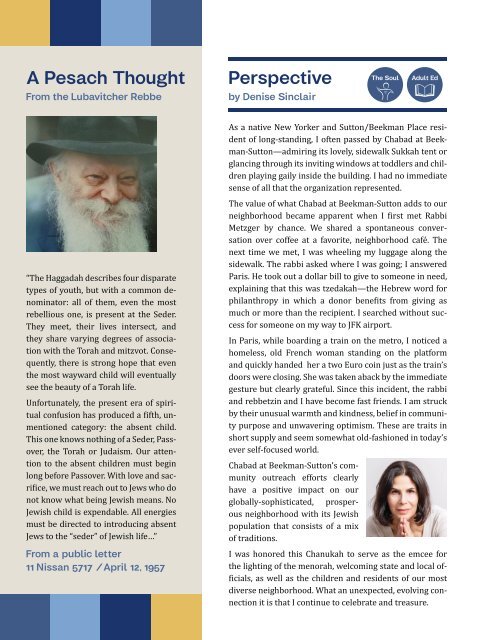Beekman Newsletter
You also want an ePaper? Increase the reach of your titles
YUMPU automatically turns print PDFs into web optimized ePapers that Google loves.
A Pesach Thought<br />
Perspective<br />
The Soul<br />
Adult Ed<br />
From the Lubavitcher Rebbe<br />
by Denise Sinclair<br />
“The Haggadah describes four disparate<br />
types of youth, but with a common denominator:<br />
all of them, even the most<br />
rebellious one, is present at the Seder.<br />
They meet, their lives intersect, and<br />
they share varying degrees of association<br />
with the Torah and mitzvot. Consequently,<br />
there is strong hope that even<br />
the most wayward child will eventually<br />
see the beauty of a Torah life.<br />
Unfortunately, the present era of spiritual<br />
confusion has produced a fifth, unmentioned<br />
category: the absent child.<br />
This one knows nothing of a Seder, Passover,<br />
the Torah or Judaism. Our attention<br />
to the absent children must begin<br />
long before Passover. With love and sacrifice,<br />
we must reach out to Jews who do<br />
not know what being Jewish means. No<br />
Jewish child is expendable. All energies<br />
must be directed to introducing absent<br />
Jews to the “seder” of Jewish life…”<br />
From a public letter<br />
11 Nissan 5717 /April 12, 1957<br />
As a native New Yorker and Sutton/<strong>Beekman</strong> Place resident<br />
of long-standing, I often passed by Chabad at <strong>Beekman</strong>-Sutton—admiring<br />
its lovely, sidewalk Sukkah tent or<br />
glancing through its inviting windows at toddlers and children<br />
playing gaily inside the building. I had no immediate<br />
sense of all that the organization represented.<br />
The value of what Chabad at <strong>Beekman</strong>-Sutton adds to our<br />
neighborhood became apparent when I first met Rabbi<br />
Metzger by chance. We shared a spontaneous conversation<br />
over coffee at a favorite, neighborhood café. The<br />
next time we met, I was wheeling my luggage along the<br />
sidewalk. The rabbi asked where I was going; I answered<br />
Paris. He took out a dollar bill to give to someone in need,<br />
explaining that this was tzedakah—the Hebrew word for<br />
philanthropy in which a donor benefits from giving as<br />
much or more than the recipient. I searched without success<br />
for someone on my way to JFK airport.<br />
In Paris, while boarding a train on the metro, I noticed a<br />
homeless, old French woman standing on the platform<br />
and quickly handed her a two Euro coin just as the train’s<br />
doors were closing. She was taken aback by the immediate<br />
gesture but clearly grateful. Since this incident, the rabbi<br />
and rebbetzin and I have become fast friends. I am struck<br />
by their unusual warmth and kindness, belief in community<br />
purpose and unwavering optimism. These are traits in<br />
short supply and seem somewhat old-fashioned in today’s<br />
ever self-focused world.<br />
Chabad at <strong>Beekman</strong>-Sutton’s community<br />
outreach efforts clearly<br />
have a positive impact on our<br />
globally-sophisticated, prosperous<br />
neighborhood with its Jewish<br />
population that consists of a mix<br />
of traditions.<br />
I was honored this Chanukah to serve as the emcee for<br />
the lighting of the menorah, welcoming state and local officials,<br />
as well as the children and residents of our most<br />
diverse neighborhood. What an unexpected, evolving connection<br />
it is that I continue to celebrate and treasure.



